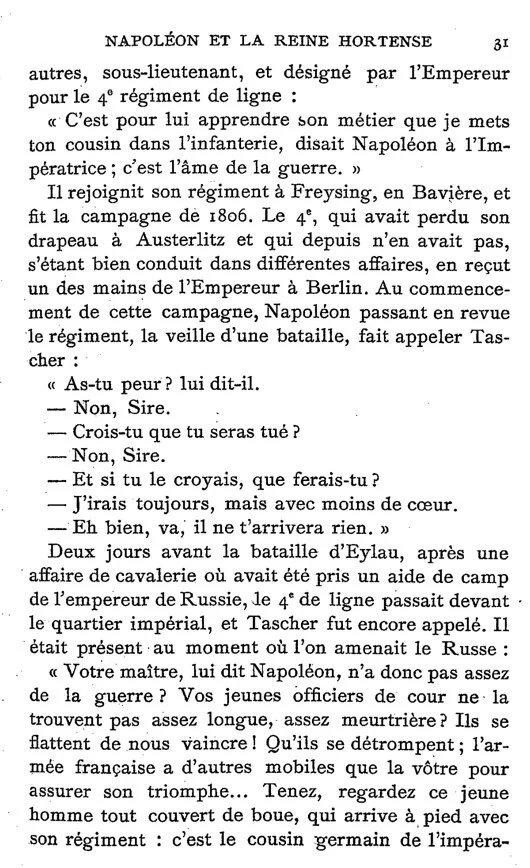This is part of a series where we translate the memoirs of Hortense Bonaparte’s friend, Louise Parquin aka Madame Cochelet. When we last left off, Louise was singing the praises of Hortense’s relative on her mother’s side, a Count Tascher - to whom Napoleon did not give special advantages when he joined the military.
[Count Tascher graduated military school, like the] others, a sous lieutenant, and he was designated by the Emperor for the 4th line regiment: "It is to teach him his trade that I put your cousin in the infantry," said Napoleon to the Empress [Josephine]; it is the soul of war.”
He joined his regiment at Freysing, in Bavaria, and campaigned in 1806. The 4th, which had lost its flag at Austerlitz and which had not had one since, after having conducted himself well in various affairs, he received one from the hands of the Emperor in Berlin.
At the start of this campaign, Napoleon reviewing the regiment the day before a battle called Tascher: "Are you afraid?" he said to him.
“No, sire.”
“Do you think you will be killed?”
”No, sire.”
”And if you thought you were, what would you do? “
”I would always still go, but with less heart.”
”Well, come on, nothing will happen to you.”
Two days before the battle of Eylau, after a cavalry affair in which an aide-de-camp of the Emperor of Russia had been taken, the 4th line passed in front of the imperial quarter, and Tascher was called again.
He was present when the Russian was brought in: "Your master," said Napoleon, "has he not had enough of the war? Don't your young court officers find it long enough, deadly enough? They pride themselves in defeating us! Let them think again; the French army has other motives than yours to ensure its triumph ... Here, look at this young man all covered in mud, who arrives on foot with his regiment: he is the first cousin of the Empress Josephine! Well! He has no advantages to hope for if he does not deserve them: with such principles, the French army is invincible.”
At Eylau, the 4th line was almost entirely destroyed. When the Emperor reviewed it the next day, he appeared saddened. He seemed to be looking for the young Tascher and when he did not see him, he inquired with interest what had become of him.
He was told that he was slightly injured. He sent for an ambulance and appointed his orderly officer to look after him.
Count Tascher’s state of destitution and suffering did not surprise him: "For a Creole," he said to him, "it's a bit hard, isn't it, Tascher? But you did your duty, I'm happy, your bad time is over. What do you need now? Do you have shirts
"No, sire, I have only the one I have worn for ten days."
“I can't give you any, because I don't have any either; but you are going to go to Warsaw, where you will have money to buy some.”
The Emperor gave him a signed voucher without fixing a sum, and the young man took only fifty napoleons.
Later, the Emperor married him to a princess of the Leyen, niece of the prince primate.
In 1814, in Paris, I only saw him for a moment. He came from the imperial quarter which he had joined at Guingnes, where he had announced to Napoleon the victory of the Battle of the Mincio by Prince Eugene over the Austrians. He returned to Italy in great haste, and only stopped in Paris long enough to give the Queen details of the Emperor's victory at Nangis and ask her for her commissions for Italy. He told me, for a long time after, all the events -
…
Cela fait partie d'une série où nous traduisons les mémoires de l'amie d'Hortense Bonaparte, Louise Parquin alias Madame Cochelet. Lorsque nous nous sommes arrêtés pour la dernière fois, Louise chantait les louanges de la parente d'Hortense du côté de sa mère, un comte Tascher - à qui Napoléon n'a pas accordé d'avantages spéciaux lorsqu'il est entré dans l'armée.



